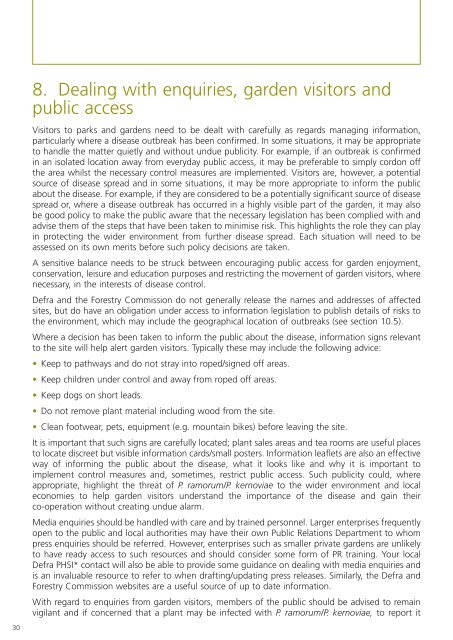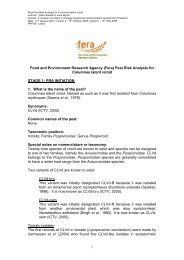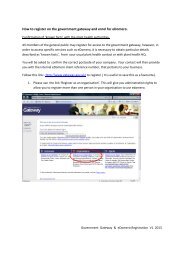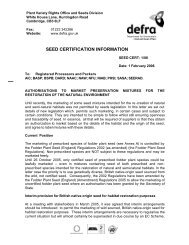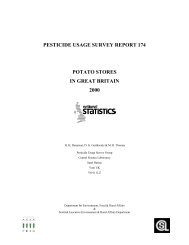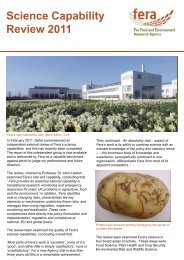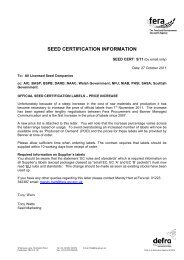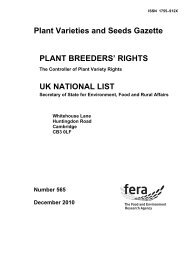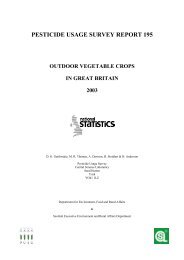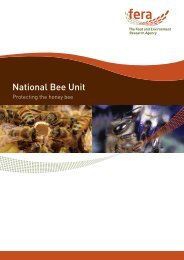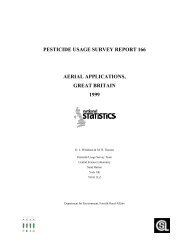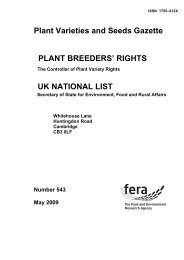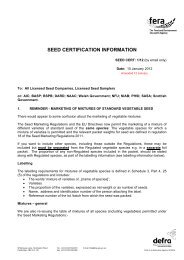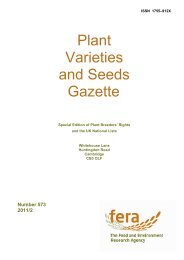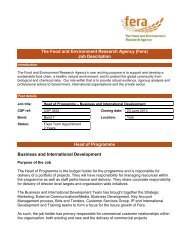Phytophthora ramorum - The Food and Environment Research ...
Phytophthora ramorum - The Food and Environment Research ...
Phytophthora ramorum - The Food and Environment Research ...
Create successful ePaper yourself
Turn your PDF publications into a flip-book with our unique Google optimized e-Paper software.
8. Dealing with enquiries, garden visitors <strong>and</strong><br />
public access<br />
Visitors to parks <strong>and</strong> gardens need to be dealt with carefully as regards managing information,<br />
particularly where a disease outbreak has been confirmed. In some situations, it may be appropriate<br />
to h<strong>and</strong>le the matter quietly <strong>and</strong> without undue publicity. For example, if an outbreak is confirmed<br />
in an isolated location away from everyday public access, it may be preferable to simply cordon off<br />
the area whilst the necessary control measures are implemented. Visitors are, however, a potential<br />
source of disease spread <strong>and</strong> in some situations, it may be more appropriate to inform the public<br />
about the disease. For example, if they are considered to be a potentially significant source of disease<br />
spread or, where a disease outbreak has occurred in a highly visible part of the garden, it may also<br />
be good policy to make the public aware that the necessary legislation has been complied with <strong>and</strong><br />
advise them of the steps that have been taken to minimise risk. This highlights the role they can play<br />
in protecting the wider environment from further disease spread. Each situation will need to be<br />
assessed on its own merits before such policy decisions are taken.<br />
A sensitive balance needs to be struck between encouraging public access for garden enjoyment,<br />
conservation, leisure <strong>and</strong> education purposes <strong>and</strong> restricting the movement of garden visitors, where<br />
necessary, in the interests of disease control.<br />
Defra <strong>and</strong> the Forestry Commission do not generally release the names <strong>and</strong> addresses of affected<br />
sites, but do have an obligation under access to information legislation to publish details of risks to<br />
the environment, which may include the geographical location of outbreaks (see section 10.5).<br />
Where a decision has been taken to inform the public about the disease, information signs relevant<br />
to the site will help alert garden visitors. Typically these may include the following advice:<br />
• Keep to pathways <strong>and</strong> do not stray into roped/signed off areas.<br />
• Keep children under control <strong>and</strong> away from roped off areas.<br />
• Keep dogs on short leads.<br />
• Do not remove plant material including wood from the site.<br />
• Clean footwear, pets, equipment (e.g. mountain bikes) before leaving the site.<br />
It is important that such signs are carefully located; plant sales areas <strong>and</strong> tea rooms are useful places<br />
to locate discreet but visible information cards/small posters. Information leaflets are also an effective<br />
way of informing the public about the disease, what it looks like <strong>and</strong> why it is important to<br />
implement control measures <strong>and</strong>, sometimes, restrict public access. Such publicity could, where<br />
appropriate, highlight the threat of P. <strong>ramorum</strong>/P. kernoviae to the wider environment <strong>and</strong> local<br />
economies to help garden visitors underst<strong>and</strong> the importance of the disease <strong>and</strong> gain their<br />
co-operation without creating undue alarm.<br />
Media enquiries should be h<strong>and</strong>led with care <strong>and</strong> by trained personnel. Larger enterprises frequently<br />
open to the public <strong>and</strong> local authorities may have their own Public Relations Department to whom<br />
press enquiries should be referred. However, enterprises such as smaller private gardens are unlikely<br />
to have ready access to such resources <strong>and</strong> should consider some form of PR training. Your local<br />
Defra PHSI* contact will also be able to provide some guidance on dealing with media enquiries <strong>and</strong><br />
is an invaluable resource to refer to when drafting/updating press releases. Similarly, the Defra <strong>and</strong><br />
Forestry Commission websites are a useful source of up to date information.<br />
With regard to enquiries from garden visitors, members of the public should be advised to remain<br />
vigilant <strong>and</strong> if concerned that a plant may be infected with P. <strong>ramorum</strong>/P. kernoviae, to report it<br />
30


